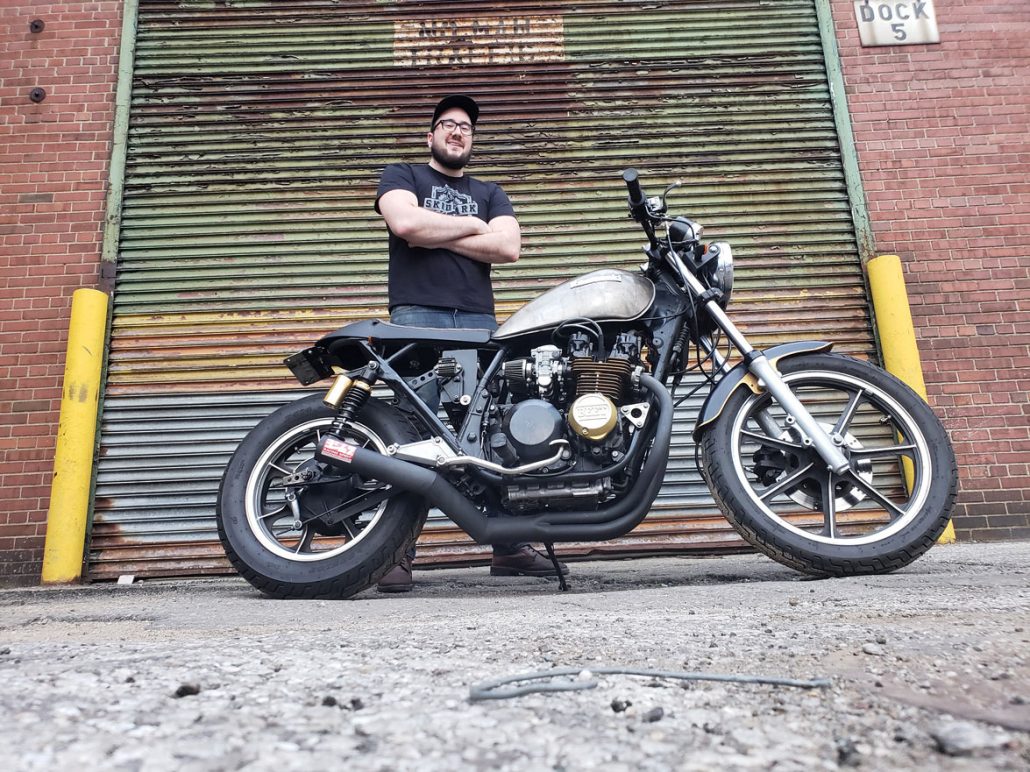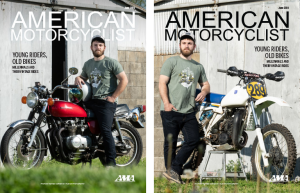AMERICAN MOTORCYCLIST JUNE 2019
Young riders and the motorcycles of yesteryear
These Millennials Have An Affinity For Vintage
Even as modern motorcycles become increasingly sophisticated, there is a growing group of younger riders who favor carburetors over fuel injection, drum brakes over discs and simple instrumentation over elaborate digital dashboards.
Many millennials celebrate motorcycling’s heritage by maintaining, riding and racing bikes from generations past.
Evidence of the growing vintage motorcycle movement can be seen in the rise of vintage-themed events across the nation, including AMA Vintage Motorcycle Days in Ohio, the Quail Vintage Motorcycle Gathering in California and the Barber Vintage Festival at Barber Motorsports Park in Alabama.
These are the stories of four millennials who found and fostered a passion for old bikes.
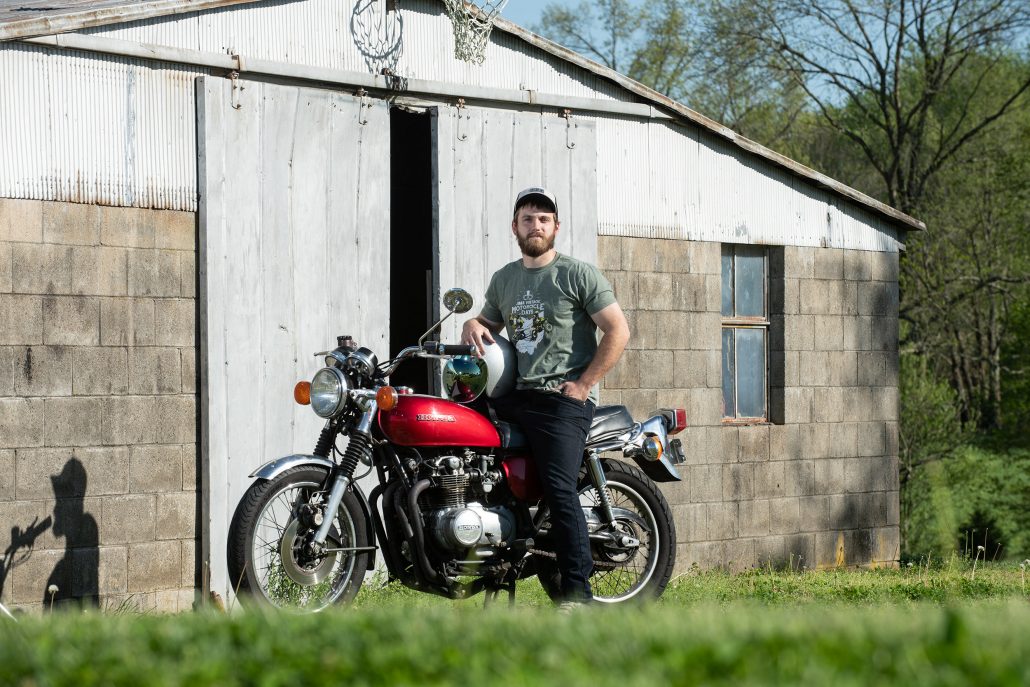
Chris Carter owns four vintage Hondas, including this 1976 Honda CB550.
Chris Carter
Crandall, Ind.
Vintage motorcycle racer Chris Carter’s first motorcycle seat was the gas tank of his father’s 1972 Honda CL100.
The 26-year-old from Crandall, Ind., said he remembers those rides well and credits them as one of the reasons he got into vintage motorcycles.
Motorcycling has played a big role in Carter’s family. His grandfather was the part owner of a Suzuki dealership, and his dad began riding and racing motorcycles in the 1970s.
While the rides around the yard with his dad instilled an interest in vintage motorcycles, it was his first trip to AMA Vintage Motorcycle Days that solidified his interest in riding and racing them.
The Carter family garage is home to a small fleet of vintage motorcycles, including a collection of Hondas (two Z50s, a 1974 XL70 and a 1976 CB550). He uses the Z50s for riding around the family backyard, and bought the XL70 off an instructor at his trade school.
Admittedly not much of a street rider, Carter said it was the styling of the CB550 that attracted him to the bike.
“Me and a buddy found a couple of them on Craigslist one day around Indianapolis,” he said. “So we drove up there in his little Chevy Colorado and picked them both up the same day. With all that weight in the back of his little pickup, we were damn near doing a wheelie in his truck the whole way home. I had to do a little carb work to mine and replace the clutch. But, other than that, it has been a great bike.”
Carter also owns two racing motorcycles, a 1982 Yamaha YZ125 and a 1983 Husqvarna 250 XC. He said he has plans to race the Husqvarna in the hare scramble and motocross events at 2019 AMA Vintage Motorcycle Days, featuring Honda, in July.
“I really enjoy racing vintage bikes,” he said. “I think as a rider it gives me a greater appreciation for the old guys that made the sport what it is today. These older bikes didn’t have the technology and development that modern bikes have. So, for you to go fast on one of these machines, you had to be a dang good rider.”
For the next vintage racer he adds to his collection, Carter is looking for a pre-1974 machine, because both of his current motorcycles compete in post-vintage classes.
He’s also in the market for another 50cc machine for the next generation of Carter motorcycle racers.
“I had my first child last year,” he said. “She just turned 1. So I’ve been looking for an older [Suzuki] JR50 for her to learn on. I think vintage racing would be a good way for her to get started in competing on motorcycles.”
Carter said most of his friends who ride are into modern motorcycles, but they have taken note of his interest in older bikes.
“I would talk about these old bikes, and I feel like they were thinking I was crazy,” he said. “Like, ‘Why in the world do you think these old clapped out pieces of junk are cool?’ But I like to think maybe I got the ball rolling for a couple of them to want to get into the vintage scene.”
Carter views vintage bikes as a cost-effective gateway for getting new riders into motorcycle competition.
“Most people don’t have deep enough pockets to go out and be competitive on a modern bike,” he said. “Vintage bikes are a lot less expensive to buy and maintain.”
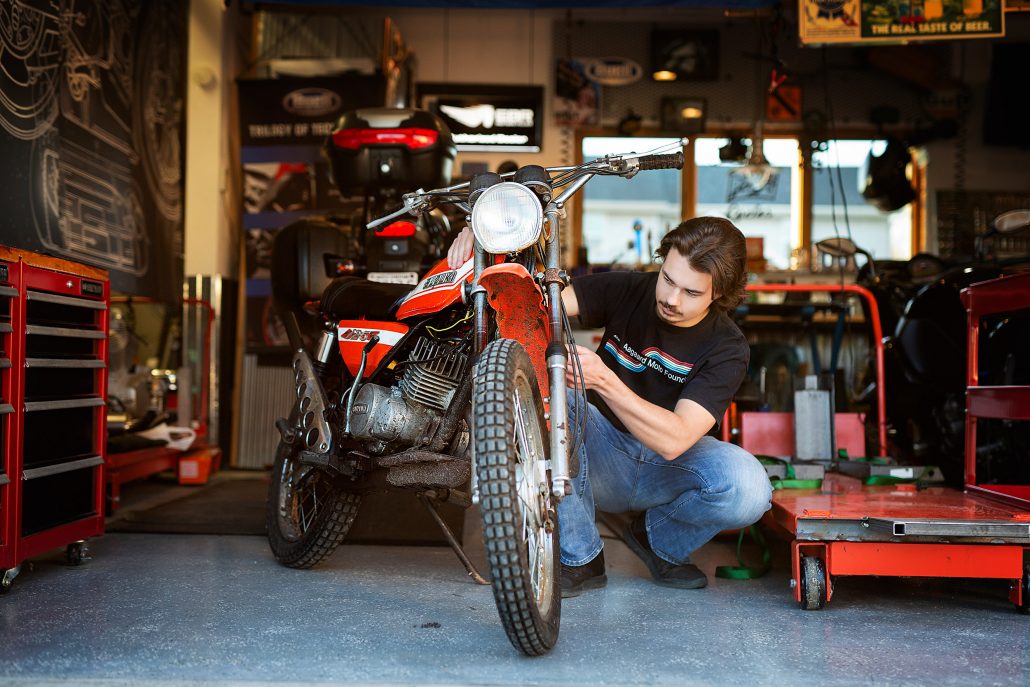
Alec Aagaard’s 1972 Suzuki TS125 has been a work in progress since he got it home.
Alec Aagaard
Janesville, Wis.
Janesville, Wis. resident Alec Aagaard started out riding modern motorcycles, but found that riding vintage machines is a wholly different riding experience. The 20-year-old started riding at age 4 on a 2005 Honda CRF50F.
“I have very vivid memories of my father and the sales guy lifting it into the back of his pickup,” he said. “As soon as we got it home, he showed me where the kill switch was and made sure I knew how to use it, then he let me go free. I still have the bike to this day.”
Aagaard and his father Charles built a strong bond working together on repairing almost anything, especially Buell motorcycles.
It was a father-son trip to Ohio in his early teens that turned the younger Aagaard on to vintage motorcycles.
“When I was about 12 or 13, my father and I went on a motorcycle trip together where we visited the AMA Motorcycle Hall of Fame and then we went to AMA Vintage Motorcycle Days for the afternoon,” he said. “We both realized how cool the weekend event was and have been going every year since.”
While only one of Aagaard’s four motorcycles is a vintage bike—a 1972 Suzuki TS125—he’s confident that that number will increase in the years to come.
His Suzuki has been an ongoing project since he got it home, and he’s planning on using the summer to do a full engine rebuild on it.
“My uncle picked this bike up from a buddy of his and got it running,” he said. “It was actually my graduation present. I rode it previously at his house. When I got it home, I unloaded it out of my truck, and when I went to go ride it around the yard, it started for about a second, made a loud pop, and after that it became my problem child.”
Aagaard also hopes to pick up another vintage machine that he will feel more comfortable racing. Maybe he will find it at the AMA Vintage Motorcycle Days swap meet this year.
What impresses him most about vintage motorcycles is their ease of maintenance.
“My favorite thing about them is that they are so simple,” he said. “They have simple tech in them, and it makes working on them a breeze, except when I need to get parts.”
He said his friends and family know him to be a “gearhead,” so it’s not surprising that he took up vintage motorcycling. And his girlfriend has taken an interest in the topic.
“She’s been into motorcycles since she met me and started operating her own bike last summer,” he said. “I would like to pick up an older Honda Elsinore or trail bike for her to ride around, something she and I could put some time into together.”
Thomas Hayes
Lakewood, Ohio
Thomas Hayes—a 31-year-old from Lakewood, Ohio—started his riding adventure on a vintage motorcycle.
His decision to buy a vintage machine for his first bike was based on budgetary constraints. Three years ago, he bought his 1982 Kawasaki KZ550 for $1,000 and quickly discovered it was more of a basket case than he’d thought it would be.
“The seat was a piece of a skateboard, the sprockets were almost all gone, and the tires were original from 1982,” he said. “It was also impossible to start, as the chokes on the carbs were broken.”
Those issues revealed to Hayes another aspect of vintage bike ownership: Maintenance.
Sometimes a vintage motorcycle will present more problems after purchase than were apparent. But older bikes also often are easier to work on.
After making the initial repairs to his KZ550, Hayes rode it to his hometown of Montreal, Quebec, Canada. During the ride back to Lakewood, the KZ began showing its age. The engine began spewing oil.
Rather than allow the breakdown to kill his enthusiasm for his bike, Hayes doubled down. He rebuilt the four-cylinder engine.
“I went so far as replacing my crankshaft bearings,” he said. “I enjoyed getting dirty over the winter and finally hearing her roar to life again in the spring.”
After successfully tackling the engine rebuild on the KZ, Hayes went to work finding his next vintage project. He ended up with a 1980 Puch Maxi moped.
While he’s ridden late-model motorcycles, the experience with the new hasn’t dulled his passion for the old.
“I’ve rented modern machines while on vacation, and they are great, but there is something about analog dials and carbureted four-cylinder engines,” he said.
Hayes credits his association with Skidmark Garage—a community garage in Cleveland, Ohio—with playing an important role in allowing him to live the motorcycle lifestyle.
“I gained a great deal of knowledge about carbs from other members of the garage,” he said. “It would be very difficult for me to continue having vintage bikes without Skidmark. I rent my apartment. I have a very limited number of tools. And I don’t have place to work on my bike.”
Hayes’ passion for vintage motorcycles caught the attention of his friends and family. He said one of his friends has obtained a motorcycle license.
“My mom seemed the most concerned, but more from a general motorcycle aspect and not from it being a vintage machine,” he said. “A lot of my friends find my motorcycle and hobby quite interesting.”
Marshall Barnes
Louisville, Ky.
Marshall Barnes is an all-around athlete, but vintage motorcycle competition holds a special meaning for him.
The 18-year-old from Louisville, Ky., began riding motorcycles at age 2 on a Suzuki JR50 with training wheels. He entered his first motorcycle race at age 5.
The son of a motorcycle racer, Barnes is the proud owner—with his father, Mitchell—of 12 vintage Suzuki motorcycles.
He said his dad and he were motivated to buy two of those machines after looking through some old family photos.
“Dad pulled out some old photos after my uncle passed away in 2017, and they were riding a 1975 Suzuki TM 100 and a Suzuki RM 125,” Barnes said. “My dad went out and bought a TM 100 right away, and I later bought an old RM 250 that had been restored.”
One thing that impresses the Barnes about older off-road racing motorcycles is how competitive they can still be.
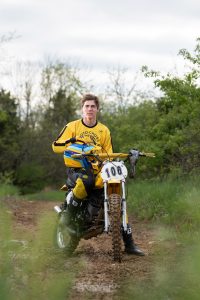 “My friends who race modern bikes don’t understand how fast the older bikes are,” he said. “Most of them have never ridden one. My 1981 Suzuki 250 that I won [a race at AMA Vintage Motorcycle Days] on is as fast as my modern bike. It just doesn’t handle the same.”
“My friends who race modern bikes don’t understand how fast the older bikes are,” he said. “Most of them have never ridden one. My 1981 Suzuki 250 that I won [a race at AMA Vintage Motorcycle Days] on is as fast as my modern bike. It just doesn’t handle the same.”
While he’s not as enthusiastic about wrenching on his family’s fleet of vintage Suzukis as his dad, Barnes had a memorable time racing several of them at 2018 AMA Vintage Motorcycle Days.
“I’m into all kinds of sports. like football, pole vaulting, and snowboarding,” he said. “The old dirt bike racing seemed like it would be fun. We went to 2018 AMA Vintage Motorcycle Days with six vintage bikes. All of them broke down by Sunday.”
Despite the troubles, Barnes did record a race win in the E3 Open Class of the motocross competition and used his athleticism to push one of the broken down Suzuki’s over the finish line in a hare scramble event.
For the Barnes family, vintage motorcycles are among the things that bring them closer together.
“I wore my dad’s old jersey when I raced at AMA Vintage Motorcycle Days last year,” he said. “It was 44 years old.”
He said his goal is to win as many vintage motorcycle racing championships as possible and is a member of several vintage motorcycle clubs.
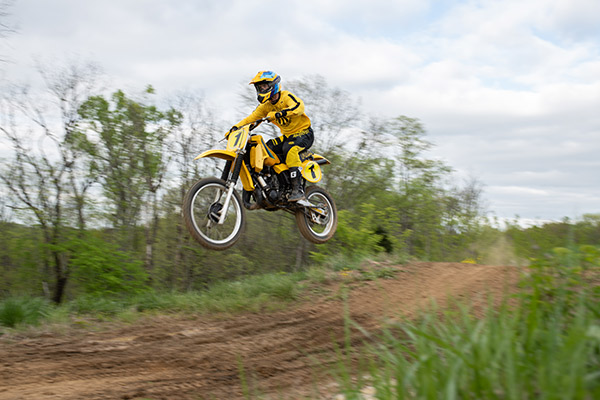
Even though all six Suzukis the Barnes family brought to 2018 AMA Vintage Motorcycle Days broke down, Marshall Barnes still notched a motocross win on the weekend.

